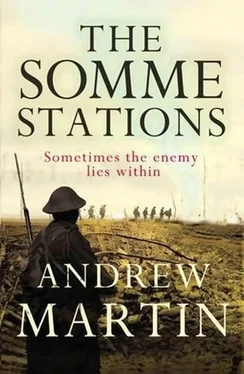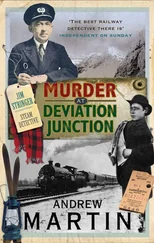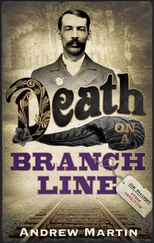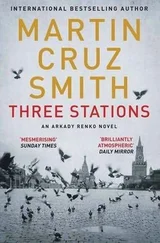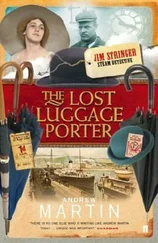I looked at Lillian Backhouse, and she didn’t know what to say. Her husband, Peter, was over forty and worn out from digging graves, so I didn’t think he’d be going off. Young Sylvia was looking at me curiously.
‘Do you want to get killed?’
‘I will definitely not get killed,’ I said.
Harry sat down on the edge of the road, and opened his book. I walked up, pulled off his cap, and ruffled his hair, to which he made no reply. I looked down at his page: two cowboys, both firing pistols at Indians on horses. One was instructing the other, ‘Only shoot to “wing”.’
Sylvia walked up, and said to Harry, ‘You should use a blade of grass.’
‘What for?’ he said, for he would speak to her .
‘To mark the place.’
‘I haven’t left off reading yet.’
‘No, but you will do.’
Harry turned the page, and I saw the same number of cowboys, but many more Indians.
‘You’re not going to sit there the whole of your life reading, are you?’ said Sylvia.
Harry made no reply.
‘I think he might very well do,’ Sylvia said to me, then: ‘Dad, will you be going to France?’
‘He must be trained first, idiot,’ said Harry, finally looking up from his book.
‘He’s right,’ I said to Sylvia. ‘Well, he’s not right to call you an idiot, and if he does it again, he’ll get a thick ear. But I’m to go first to Hull.’
‘Oh dear,’ said Sylvia, who suddenly looked near to tears. She was only six, and to my knowledge, she had never been to Hull, nor had any knowledge of it. But it was just the sound of the word that was so disheartening.
Lights-out at had been at ten-fifteen, half an hour since. I looked directly upwards, at the concrete ceiling, feeling like my own son, as I lay worrying, with my three blankets pulled right up about my neck and the book that my own son had sent me, The Count of Monte Cristo , under the blankets beside me. On top of my blankets I’d spread out a copy of the Yorkshire Evening Press for a bit of extra warmth. The largest of the headings read, ‘Allies Continue to Make Steady Progress’. Apparently we’d been making steady progress ever since the show began. By rights we ought to have been in Berlin by now. Only we weren’t.
On the floor above, bags of grain were still kept, and the Number One Warehouse at ‘C’ Wharf of Alexandra Dock, smelt barn-like as a result. On the floor below were drill hall, mess room, reading room, quartermaster’s stores and so on. At the end of my cot, and shuddering at intervals in the sea wind, were mighty double doors, barricaded up to a height of four feet by sandbags. If you pulled away the sandbags, opened those doors and stepped through, you’d drop down onto the dockside and be instantly killed. They were meant for connecting, via gangways, with the decks of ships. But there was only one ship in dock at present, and that was the North Eastern company’s own steamer, the SS Rievaulx Abbey , and it housed the officers of the battalion: the 17th Northumberland Fusiliers; or the Railway Pals.
We’d spent most of the day drilling in squads on the quays and doing Swedish exercises, which was what the army called physical jerks. I ought to have been worn out…
There were fifty cots in my row, which housed ‘E’ Company. I was in E Platoon of ‘E’ Company, so that was easy to remember. We were mainly York blokes in E Platoon. To my right lay Alfred Tinsley, the engine cleaner I’d seen eyeing the Lanky engine on the day the news about the battalion had been circulated. He’d turned eighteen on our arrival at Hull – so he’d lied about his age on enlisting. He’d latched on to me, having recognised me after that brief exchange of ours, and having heard I’d started my railway life on the footplate before giving it up for some mysterious reason.
He was reading, as best he could in the faint light from the few hurricane lamps that burned low between the cots – the Railway Magazine. He was a subscriber, as I was myself, but I knew that Tinsley kept his very carefully, so he could send them home for binding in red cloth with gold lettering. As I looked on, he closed the pages and slid the magazine under his bed, at which a voice called out, rather nastily: ‘No time for the railway hobby now, Tinsley.’ Well, we might have been called ‘The Railway Pals’, but that didn’t mean we were .
I turned the other way and there, separated from me by three snoring porters, was Oliver Butler, head propped on hand, staring my way. He didn’t flinch as I faced him, either, but just carried on staring as if it was his perfect right.
Was it all on account of that business in the Bootham Hotel, when he’d reminded the Chief that he was beyond his jurisdiction? It was Dawson, the cockney porter, who’d been rated by the Chief, not Butler himself, so why was he looking daggers at me? In fact, I had a pretty good idea. We were rivals: we were of about an age; both married men; both kept a clean collar at work; both hoping to be promoted, but keeping quiet about the fact. I was a detective sergeant in civilian life, so I was part of the boss class, and could expect to be promoted before him. Secondly, I had previously been a footplate man, and all train guards have a down on footplate men, since they ride at the business end of the trains.
I turned and lay flat, looking up again, listening to the hundreds of snorers, like a band playing out of time. Dawson himself did not seem to be on the battalion strength; at any rate, I had not yet set eyes on him. He must have dodged the Chief somehow.
‘ Fusilier ,’ whispered Butler. We were called fusiliers, not privates, and he was addressing me.
I faced him again. His white face had the glow of candlewax; his hair had an oily black shine about it. He looked like a man who considered himself handsome.
‘You’re to go in to see the CO tomorrow,’ he said, and something that turned out to be a smile crept over his face.
‘How do you know?’
It was the first I’d heard of it.
‘It’s on the dining hall notice-board – went up just after supper.’
He was ever watchful of that notice-board, keeping an eye out for all promotions.
‘Why?’ I said.
‘Well, they wouldn’t keep a good chap like you in the ranks.’
From behind him, a very Yorkshire voice, shaky with held-back laughter, said:
‘I’m off now… off to sleep.’
Another, similar voice replied, ‘Are you ’n’ all?’
After an interval, the first one said, ‘I’m going now… I’m on my way.’
A further pause, then the second one said, ‘Have you gone yet?’ and I could hear the first bloke laughing under his blankets, so that the word ‘Aye’ came out with a splutter of laughter.
Oliver Butler held my gaze throughout. The speakers were his two cracked brothers: the identical twins, Andy and Roy, who called each other ‘Andy-lad’ and ‘Roy-boy’ and hardly ever spoke to anyone else. They belonged to the ruffian’s profession of platelayers or track walkers, which meant they’d spent most of their working days out in the fields. In the Butler family, all the effort seemed to have gone into creating the one wonderful creature: Oliver, the gold-braided train guard. The brothers were made of leftovers. They looked like drawings in the funny papers of very tired men: hollow faces, jaws hanging loose, eyes bulging – and their heads were too small. They were tough blokes though, no question.
For the next little while, I shifted about on my thin straw mattress, but no position answered. Oliver Butler had left off staring at me. Why was I being called in? It must be promotion. Every day, you’d see blokes sitting around sewing their new stripes onto their tunics, and trying not to look too chuffed. I would write to the wife as soon as I knew.
Читать дальше
